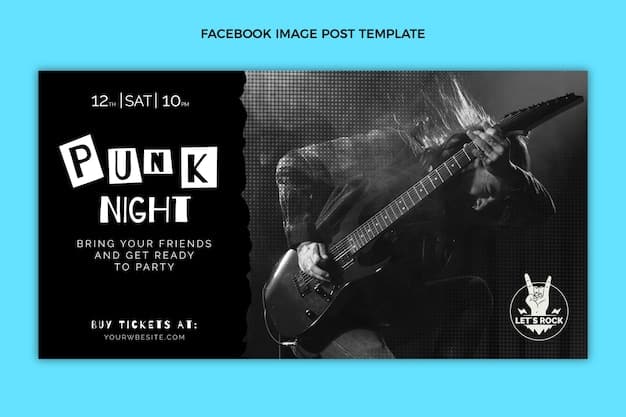Social Media’s Impact on Rock Music: Reshaping the Landscape & Album Sales

Social media has revolutionized the rock music landscape, fundamentally altering how artists connect with fans, promote their music, and ultimately, impacting traditional album sales in the digital age.
The rise of social media has brought unprecedented changes to the music industry. Let’s delve into how social platforms are reshaping the rock music scene and influencing album sales figures.
How Social Media Changed the Game for Rock Music
Social media has caused a major shift in how rock musicians connect with their audience. It has created new avenues for promotion and engagement that were not possible before.
Bands are now able to share their music directly with fans, bypassing traditional gatekeepers like radio stations and record labels.
Direct Fan Engagement
Social media platforms have become vital tools for rock bands to communicate and connect directly with their fan base.
Artists use social media to post music, behind the scenes content and tour updates instantly to their fans, creating a personal experience.
Promotion of New Music
Social media has revolutionized the way rock bands promote new music. It allows artists to announce releases, share previews, and engage fans in anticipation of new music.
Bands can also boost singles and albums through strategic ad campaigns, targeting specific demographics interested in rock music.
- Instant Updates: Real-time announcements.
- Teasers: Short video clips.
- Behind the Scenes: Intimate looks into the band’s process.

The direct interaction with followers has also made it significantly easier for musicians to gauge reception. The instantaneous feedback is critical to adapt marketing strategies and tailor material to the desires of the audience.
The Decline of Traditional Album Sales in Rock
The rise of digital music consumption, heavily influenced by social media, has significantly contributed to the decline of traditional album sales in rock music.
Streaming services and digital downloads have become the primary means of accessing music for many fans, leading to a decrease in the demand for physical albums.
Rise of Streaming Services
Streaming platforms like Spotify and Apple Music have made it easier than ever for fans to access a vast library of rock music without purchasing individual albums.
This shift has incentivizes fans to pay for monthly subscriptions rather than buying albums. Changing the business models for rock artist revenue.
Impact on Physical Sales
The convenience of digital music has led to a decrease in physical album sales, impacting the revenue streams of rock bands.
Many people are switching to streaming and digital downloads and aren’t buying as many physical albums as before.
- Convenience: Easier to find music.
- Affordability: Subscription beats buying albums.
- Accessibility: Available everywhere.
Social media has played a role in pushing for accessibility. When music can be shared with the click of a button, distribution sales has become a challenging feat of engagement and connection.
Social Media as a Marketing Tool for Rock Bands
Social media provides rock bands with a powerful marketing platform to promote their music, build their brand, and connect with fans.
Through strategic social media campaigns, rock bands can effectively reach a wider audience and drive engagement around their music.
Targeted Advertising
Social media platforms allow rock bands to target specific demographics with their advertising campaigns, ensuring that their music reaches the right audience.
By targeting ads based on interests, location, and demographics, bands can maximize their marketing spend and reach potential fans who are more likely to engage with their music.
Brand Building
Social media also serves as a valuable tool for rock bands to build their brand identity and cultivate a strong online presence.
Through consistent and engaging content, bands can create a unique brand that resonates with their fans and sets them apart from other artists in the rock music landscape.

Social media provides bands the ability to build a loyal digital following that will purchase tickets for events and streams.
The Role of Influencers in Rock Music Promotion
Social media influencers have emerged as key players in the promotion of rock music, leveraging their reach and influence to introduce new music to their followers.
Collaborations with influencers can significantly amplify a rock band’s message and expand their reach to new audiences.
Collaborations with Influencers
Rock bands can partner with social media influencers to promote their music. This introduces them to new audiences.
Influencers can share their thoughts on the band’s newest work to show support.
Amplifying the Message
Through collaborations with influencers, rock bands can amplify their message and reach a wider audience.
It can create a buzz around an album and drive new followers to a rock band.
- Wider exposure: Introduction to a new fan base.
- Credibility: Influencers are trusted by their followers.
- Engagement: Active participation from fans.
Through the use of music influencers, new rock music has the opportunity to reach the phones of millions on followers which increases engagement for rock bands.
The Future of Rock Music in the Age of Social Media
As social media continues to evolve, it will inevitably shape the evolution of rock music.
Rock band will need to adept and leverage technology to remain successful in the music industry.
Embracing new Social Media Platforms
Rock bands must stay ahead of the curve and adapt to new social media platforms to effectively reach their target audience.
By embracing new platforms and experimenting with different content formats, bands can stay relevant and connect with fans in innovative ways.
Focus on Creating Engaging Content
To cut through the noise and capture the attention of fans on social media, rock bands must focus on creating engaging and high-quality content.
This includes producing visually appealing media that will cause followers to show support for their band.
Creating content to increase visibility and engage fans will be a key component of rock bands success.
Measuring Success: Album Sales vs. Social Media Engagement
In the current music landscape, gauging a rock band’s success goes beyond just album sales figures; social media engagement plays a crucial role. It shows how well they connect with music fans.
The number of likes, shares, and comments can show new fans what is popular in music culture. Bands are rated on their ability to garner followers and engagement.
The Shift in Key Performance Indicators (KPIs)
The switch of the music industry from traditional metrics (like album sales) to views on digital platforms has shifted how bands view success.
Social engagement has become as valid as album sales, showing that engagement with an audience is an important success indicator. With the ability to like, comment and share it goes beyond just owning the media.
Balancing Act: Sales and Engagement
As the music industry is changing, it’s key to find a sweet spot that balances generating income with making people like.
Even as social media engagement gets more influence, revenue still matters. Rock bands must get creative with how they generate money through sales and streams.
- Sales figures: How listeners directly spend money on music.
- Fan Interactions: Creating connections, making music important.
- Adaptability: Finding the space between making money and being liked.
Rock bands balance the use of social media engagement and more album sales to measure their success. Keeping up good numbers on social media and album sales continues to be a moving target.
| Key Point | Brief Description |
|---|---|
| 📢 Social Media Impact | Revolutionized rock music promotion and fan engagement. |
| 📉 Album Sales Decline | Streaming services lead to decreased physical album sales. |
| ⭐ Influencer Role | Influencers boost rock music visibility and reach. |
| 📈 Engagement Metrics | Social media engagement now key to measuring success. |
FAQ
▼
Social media allows rock bands to connect directly with their fans, bypass traditional gatekeepers, and promote the releases and shows through targeted advertisement strategies.
▼
This is largely due to the growing popularity of streaming platforms, where rock bands can listen to a wide variety of songs. Sales is decreasing as less fans purchase albums.
▼
Influencers are able to promote rock music for rock bands to a new audience. This increases the followers and popularity of a band as it increases visibility across a broad audience.
▼
They should creatively manage to merge direct sales with follower connection. Balance the act of content creation and fan engagement and revenue from streams and advertisements.
▼
The future of rock on social media is in the embracing of developing and existing technology. To keep attracting new fans rock bands need to stay ahead of the curve to engage with their fans.
Conclusion
Social media has changed the rock music scene with the rise of the Internet and streaming services. Rock Bands need to adapt to changes like using influencers to maintain an active following. Success in album sales and social media is based on balancing engagement and keeping pace through creativity.





